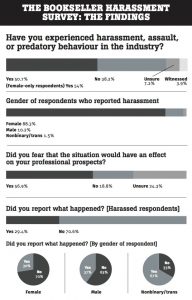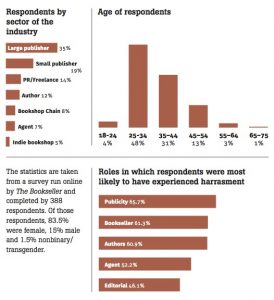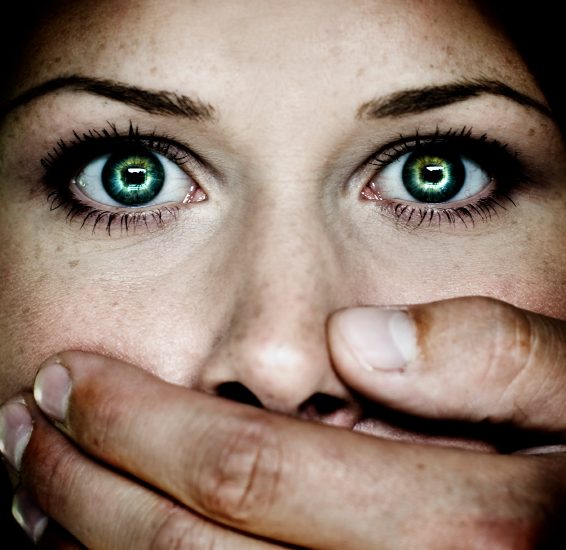In response to the waves of allegations surfacing in the film industry, The Bookseller recently published the results of an anonymous survey into sexual harassment in the publishing industry. In it, hundreds of respondents offered accounts of abuse that, together, tell the story of an endemic problem. This article originally appeared on the Society of Authors website.
Authors exploit their power and importance to coerce and abuse too – that’s one of the depressing lines coming out of The Bookseller survey on sexual harassment in publishing. They (or rather we) are not the only people at it by any means, but we figure quite heavily in the anonymous accounts. It’s shaming. Many recent commentators have pointed out that sexual harassment can come from anyone, anywhere, but that vulnerability increases if the abuser is someone ‘important’ to the victim – a VIP, a boss, or someone you are professionally required to please, such as a well-known author. So I’m not surprised, I guess, but I am appalled, because authors are supposed to be the good guys, aren’t we? To the extent that the writer’s vocation is to creatively explore who we are – to shine light on character, society, culture, truth and lies, sometimes in the face of repressive forces trying to silence them – this feels like a particularly treacherous abrogation.
 A second, related suggestion from the survey was that publicists appear to be particularly vulnerable, especially, according to respondents, when out and about on book tours with (high-earning) authors. Again, though this makes miserable reading, it isn’t surprising once you think about it. Freelancers too, it seems, are more vulnerable and perhaps less likely than others to seek or get help, because they work outside the corporate guidelines and reporting processes that constitute the (theoretical at least) protections of salaried employment. This certainly chimes with my anecdotal experience in the world of television, where I was much more aware of harassment of freelancers than I was of studio-based employees. It also reflects the stories coming out of Westminster, which expose a preponderance of predation on interns, MPs assistants and junior staffers, most if not all of whom are freelance.
A second, related suggestion from the survey was that publicists appear to be particularly vulnerable, especially, according to respondents, when out and about on book tours with (high-earning) authors. Again, though this makes miserable reading, it isn’t surprising once you think about it. Freelancers too, it seems, are more vulnerable and perhaps less likely than others to seek or get help, because they work outside the corporate guidelines and reporting processes that constitute the (theoretical at least) protections of salaried employment. This certainly chimes with my anecdotal experience in the world of television, where I was much more aware of harassment of freelancers than I was of studio-based employees. It also reflects the stories coming out of Westminster, which expose a preponderance of predation on interns, MPs assistants and junior staffers, most if not all of whom are freelance.
So why and how is publishing providing a refuge for harassers and abusers? A commonsense observation made by more than one contributor was the place that alcohol plays in all this, especially in an industry in which a lot of social and hospitality events are still a key part of doing business. And again, this echoes the Westminster experience, where drinking and talking is so much part of the job. The dangers of disinhibition that accompany overconsumption of alcohol (and other intoxicants) are old knowledge, old tropes, woven long and deep into our history, our culture and our stories, but we’re clearly not learning from them – although a quick canvass of 50-something friends inside and outside the creative industries suggests that there has been a reduction in the overall frequency of harassment since the ‘Leo Sayer’ became a thing of the past in most workplaces.
For me, perhaps the most concerning point raised by contributors to the survey was contained in the stories of victims who (had to) continue to work with their harassers and with others that know, but don’t talk openly about the abuse. People who abuse in these situations have not only (allegedly) demeaned, discomforted and sometimes assaulted colleagues. They have not only exploited the knowledge that, even though there might be ‘talk in the loos’ about them, they are either too senior or worth too much to their publishers to be called out on those lies. They have compounded the abuse by pretending afterwards that it never happened and, even more heinously, by making other influenceable people pretend the same. Having exchanged their integrity and morality for anonymity and the dubious protection of silence, abusers force victims and onlookers into the conspiracy too. This is dangerous stuff. In groups and communities of whatever size or type, maintaining silence when bad things happening can be toxic. Compelling people to collectively ignore black elephants in rooms, to normalise shared experience of humiliation, harassment and even violence, often seriously damages both victims and bystanders, as well as warping relationships, both professional and personal.
 Like many who’ve been telling their stories recently (and even more who haven’t, yet) I’ve been an occasional target throughout my working life. Incidents have ranged from demeaning words to aggressive misogyny, to unwanted touching or kissing, and beyond – and some of the perpetrators were people with considerable influence over my work and career. But I’ve been lucky. I have been frightened but not physically harmed. I don’t feel, in the end, that me or my career has been permanently damaged by those experiences, even though at times I have felt vulnerable, humiliated, angry, disempowered and self-doubting. I admit that I’ve often also kept quiet about dismal behaviour towards me and others – albeit at the level of ‘handsyness’ rather than anything more serious – as the inevitable price for being ‘in the room’. Over the years, I’ve put all these incidents away in a mental lock-box, along with the anger and hurt they engendered, and left them there… until a few weeks ago when the allegations began to emerge. Since then I’ve been feeling angry.
Like many who’ve been telling their stories recently (and even more who haven’t, yet) I’ve been an occasional target throughout my working life. Incidents have ranged from demeaning words to aggressive misogyny, to unwanted touching or kissing, and beyond – and some of the perpetrators were people with considerable influence over my work and career. But I’ve been lucky. I have been frightened but not physically harmed. I don’t feel, in the end, that me or my career has been permanently damaged by those experiences, even though at times I have felt vulnerable, humiliated, angry, disempowered and self-doubting. I admit that I’ve often also kept quiet about dismal behaviour towards me and others – albeit at the level of ‘handsyness’ rather than anything more serious – as the inevitable price for being ‘in the room’. Over the years, I’ve put all these incidents away in a mental lock-box, along with the anger and hurt they engendered, and left them there… until a few weeks ago when the allegations began to emerge. Since then I’ve been feeling angry.
Which is why I was blindsided last week when US comedian Louis CK spoke out about the allegations against him. Having seen the ‘it’s all true’ headline, I pressed the play button on the video, already dubious, and wondering how far this man was going to try to shift the blame for his wrongdoing onto ‘problems beyond his control’ as others have done. So his comprehensive, unreserved mea culpa took me completely by surprise. Even more than that, hearing him take explicit, blow-by-blow responsibility for his disgraceful abuse of power as well as for all the many impacts this has had on his victims and their entourage triggered a kind of catharsis. Somehow, hearing this abuser admit full ownership of his misdeeds towards others made me feel less burdened, less angry, less hurt – I experienced, I think, a kind of vicarious restorative justice.
I’m not excusing CK, much less absolving him, but in breaking that oh-so-toxic silence, rather than compounding it with further abusive denials, he retrieved something of his humanity and offered, at the very least, a shot of anti-venom to those he has hurt, and incidentally to me too. I’d like to think that other transgressors might be persuaded to follow his example.
So while we wait for the (inevitable) next headline, what should we, as authors, be doing about all this? Calling for existing guidelines and codes of practice to be strengthened and clear reporting processes established, that’s certain. Demanding that the creative industries as a whole work much harder and more closely together to ensure that everyone working in them has protection, all of the time, not just some people, some of the time – absolutely. But I think we could be using our creativity and skills to dig in deeper here too. Personally, I don’t believe that men abuse women because it is in their nature. I think they abuse because, in some subdural social sense, and despite all the gains that feminism has made, they still have permission to so do. This is an unpleasant truth – but my instinct is that many unpleasant truths will need to be written about, spoken, and heard, before we can say we’re making any real progress.

